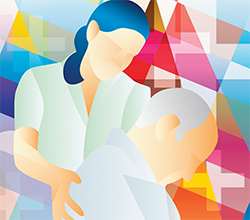
Image Credit: Pascal Fossier/CORBIS
DALLAS—Scott Morris, MD, a primary care physician, as well as an ordained United Methodist minister and founder of the Church Health Center in Memphis, gave a stirring Conley Lecture on Medical Ethics.
Explore This Issue
November 2015Dr. Morris began by telling the audience about a day when he was faced with a challenging situation: He was about to examine a teenage girl wearing a black burka.
His rule when this happens, he thought, should be to stay as far away as he could and avoid touching the patient. But he needed to hear the girl’s heart, and the girl’s father gave him permission to perform his exam.
He lifted the cloth, which was “just black on top of black on top of black. But underneath it all, she was just a teenager,” Dr. Morris said. “And she was wearing a T-shirt that said, ‘Kiss me, I’m Irish.’”
The story was a vivid flash of humanity in a world of medicine that, he says, has been overrun by technology at the expense of the human touch and spirituality. In the process, healthcare practitioners have lost their focus on what’s important.
Dr. Morris advised his colleagues that effective care requires a human touch. “Our
healthcare system is not making us healthier,” he said. “But in order to make the change, we need to stop seeing our bodies as little machines. Instead, we need to intentionally remember our humanity. Our humanity is who we are.”
Restoring the Goals of Medicine
The Church Health Center, created in Memphis in 1987 to provide quality, affordable healthcare to the uninsured, sees about 50,000 patients a year without accepting government funding. Patients are charged according to income level, and the average visit costs a patient about $25. The center has a particular focus on health education and prevention because, according to its website, its founders “believe we have a responsibility to take care of the bodies God gave us.”
Even though 17% of the gross domestic product in the U.S. is spent on healthcare, many of our outcomes are no better than those in developing countries, he said.

Image Credit: Dmitry Naumov/SHUTTERSTOCK.com
He issued a “prescription” to physicians: gentleness, kindness, compassion, humility, patience, and love. “I realize this is not how the American health system works; I know that,” Dr. Morris said. “But what we’re doing now doesn’t improve health. Who really cares if you live two years longer if that means two years longer in a nursing home? Life for life’s sake makes no sense. Breathing in; breathing out. I’m not signing up for that, are you?”